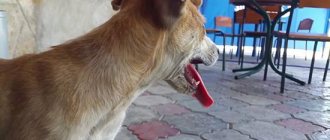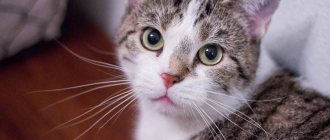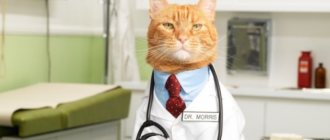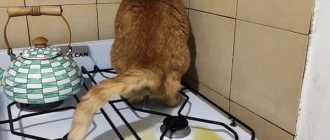Danil Ignatievich Safronov
veterinarian Petstory
When a cat coughs, owners often ask – is this normal? Basically, coughing is a protective reflex designed to remove foreign particles, mucus, and microbes from the respiratory tract. It is not always a cause for concern, but if the cough persists, you may need to consult a veterinarian.
- What can you do at home?
How do cats cough?
The cough reflex occurs due to irritation of special receptors (mechanoreceptors or chemoreceptors) that are located throughout the respiratory tract. Therefore, it is sometimes difficult to tell just by the presence of a cough whether it is a consequence of a problem in the lower or upper respiratory tract.
When coughing begins, the pet takes a certain position: it stretches its neck forward as much as possible, presses itself to the floor and makes sounds that can be mistaken for vomiting. He can open his mouth wide, stretch out his tongue, and sudden movements of the chest and abdomen are also noted.
Why this can happen: natural predisposition
If you are the owner of an “English” or a Persian cat, then you will most likely have to come to terms with his “oddities”. The fact is that animals of these breeds belong to the so-called brachycephalic varieties. This is the “scientific” name for mammals that have a shortened head with a characteristic “flat” muzzle.
In the process of breeding such animals, breeders encountered a lot of difficulties. So, the same Persians have a lot of genetic anomalies, many of which are tied to the genome, which provides these animals with a shortened full face of the skull. Whatever one may say, from a natural point of view such a structure is nonsense. In particular, all cats of these varieties are extremely unstable to the effects of very high and low temperatures: the air simply does not have time to warm up or, on the contrary, cool down in their nasal cavity.
In winter, Persians, Britons and cats similar to them constantly catch colds (they should not be allowed outside at all when the ambient temperature drops below 10° Celsius). In the summer, it’s hard and difficult for them to breathe in the heat - hence the “grunting”. Because of this, your pet regularly sneezes when he gets into a dusty room: his respiratory organs simply do not have time to filter everything. But there may be more to it than that.
The problem also lies in the structure of the soft tissues of their palate. Over time, especially in old pets, it can simply “sag,” thereby blocking the normal flow of air. Because of this, the animal becomes even more like a pig. In principle, there is no particular problem here, but... if the grunting becomes incessant, and your cat cannot sleep normally due to “heroic” snoring, we strongly advise you to take him to the veterinarian. It is quite possible that he will need surgery to correct the structure of the soft palate. During the intervention, the surgeon will cut off the “extra” parts that interfere with the normal passage of air. Another sign that “clearly hints” at the need for such a procedure is vomiting, which occurs with particularly strong “grunting”. But there are other causes of grunting breathing, many of which are not so “harmless”.
Why does a cat cough - the main reasons
The causes of cough can be both physiological and pathological factors. If your cat coughs rarely and for short periods of time (every few months or even less), then this may be normal.
If we talk about pathology, then there is a dry cough and a wet one. Dry sounds like wheezing and does not contain mucous secretions. A wet cough resembles a crackling or gurgling sound and is accompanied by the secretion of mucus. At night, it accumulates in the bronchi, and therefore, after sleep, the cough may be more pronounced.
As noted above, sometimes owners may confuse vomiting with coughing. Therefore, you first need to determine exactly what an attack is. If there is no visible discharge (foam, pieces of undigested food or foreign objects), then this is most likely a cough reflex.
Many brachycephalic breeds (Persian, Exotic Shorthair, Himalayan, Scottish, etc.) experience so-called reverse sneezing with a characteristic grunting or snoring sound, which can also be confused with a cough. But this process is normal for animals.
I would also like to draw attention to the fact that coughing in dogs is the main symptom of heart failure. In relation to cats, this is just a misconception, which, unfortunately, is still widespread among owners of breeds predisposed to heart pathologies (for example, Sphynx, British). It is important to remember that with heart disease, the leading symptoms in cats will be shortness of breath and heavy wheezing breathing.
Asthma
A common disease that causes swelling and narrowing of the airways. Often with asthma there is a situation when the cat coughs, as if he wants to vomit. This is due to the release of mucus when coughing, which the pet then swallows back. Although asthma cannot be completely cured, its symptoms can be relieved with medication. Triggering factors that cause asthma include: pollen, dust mites, various strong-smelling substances (tobacco smoke, perfumes, aerosols).
Respiratory infections
They are caused by viral, bacterial, fungal pathogens and are accompanied by inflammation, swelling of the tissues of the respiratory system, and accumulation of mucus in the bronchi. With these diseases, the pet usually coughs and sneezes heavily.
Hurry up, choose a box and find out what gift awaits you
Discount on pet insurance
Promo code copied to clipboard
Parasitoses
There are several diseases in which helminths can be localized directly in the lungs (elurostrongylosis, capillariasis, toxocariasis) or in the chambers of the heart (dirofilariasis), provoking a cough attack.
Pleural effusion
This is an abnormal accumulation of fluid in the chest cavity, which causes irritation of the lung tissue and, as a result, is accompanied by coughing attacks. Occurs for a variety of reasons: complication of infection, neoplasm in the chest, heart failure, trauma.
Neoplasms (tumors), polyps
They are found in both elderly and young animals in various parts of the respiratory system. They can be benign or malignant and can partially or completely block the airways.
Injury
Physical, chemical or thermal damage to the respiratory tract (for example, an unsuccessful fall from a height, a car injury).
Foreign objects
When a cat coughs as if she is choking, it may be due to small particles of food, grass, or other objects getting into her respiratory tract. Animals will experience wheezing, sneezing, restlessness, and attempts to paw at foreign objects.
What to do when a cat chokes
When your pet coughs and wheezes, constantly rubs its mouth with its paw, opens its mouth wide and sticks out its tongue, you should be wary. The cause may be a foreign body. An insect, small parts of toys, scattered beads, toilet filler, strings, and plastic bags can get into your pet's mouth. Often, a kitten may cough after accidentally swallowing Christmas tree tinsel, threads from a ball and other objects that it uses for games. Sometimes the situation is more serious. The cat swallows a spicy fish or chicken bone, which gets stuck in the throat and makes it difficult to breathe. If the problem is not addressed urgently, the animal may suffocate or die from bleeding after soft tissue damage.
A careful examination will help you find out the real reason. You need to take the pet in your arms and open its mouth. If a foreign object cannot be found in the mouth, you need to urgently take the animal to the clinic. In this case, the veterinarian will tell you what to do if the cat is coughing. The doctor will examine the throat, determine exactly where the foreign body is located, and try to push it through, freeing the throat. If this is not possible, the pet will undergo surgery. You can’t put off a trip to the clinic: if a sharp object gets into the esophagus, the clock counts.
A hairball stuck in the throat does not require removal. The cat manages to either spit it out or swallow it. Frequent brushing of your pet will help prevent further licking of lost hairs. It is recommended to regularly give your cat a special paste with fish or meat flavor, which can be purchased at a veterinary pharmacy. The drug promotes the rapid and painless dissolution of hairballs trapped in the stomach.
Diagnostics
To diagnose all the causes of cough and wheezing described above, a medical history is first taken. This is an important part of making a diagnosis. The veterinarian must present a clear picture of what is happening - what the pet eats, whether it is vaccinated or not, whether it has been treated for parasites, when the first symptoms began, whether there is vomiting, etc. After collecting an anamnesis and examination, a number of special laboratory and instrumental tests are prescribed.
The main ones are: auscultation (listening) of the lungs using a phonendoscope; clinical blood test and biochemical study of blood serum (if necessary); stool analysis for helminth eggs (carried out to exclude the presence of parasites in the intestines); specific tests for the presence of bacteria and viruses (for example, the polymerase chain reaction (PCR) method - to detect herpes virus infection, calicivirus, mycoplasmosis, bordetellosis).
Instrumental diagnostics include: chest X-ray, ultrasound examination of the heart and lungs, computed tomography (CT) and magnetic resonance imaging (MRI). An important stage of diagnosis is bronchoscopy with collection of material for cytological and bacteriological examination. If there is effusion in the chest cavity, it is also subjected to cytology and bacteriological examination.
All procedures that require immobilization of the pet are performed under sedation or anesthesia, and the cat usually remains in the veterinary clinic for several hours.
Veterinarian recommendations
Each diagnosis requires special treatment:
- For example, infections are treated by increasing the animal’s immunity, which in the case of an allergic cough can worsen the patient’s condition. Antihistamines are needed here. If an allergen is identified, it is advisable to completely eliminate it from the animal’s life.
- For asthma, inhalers are prescribed; if this does not help, glucocorticoids are prescribed.
- A course of antibiotics is used to treat viral infections. Cough is eliminated with the help of mucolytics and expectorants.
- Helminthiasis is treated comprehensively, and medications are taken twice to completely destroy adult worms and their offspring. Be sure to monitor the animal’s condition after such treatment; in case of dehydration and exhaustion, infusion solutions are prescribed.
- When removing a foreign body, various tissue damage is sometimes discovered. Wounds are treated with anti-inflammatory drugs, and antibiotics are prescribed if necessary.
In any case, one well-known fact should be remembered. The best treatment for cats, as well as for people, is prevention and prevention of the disease.
How and what to treat a cat's cough
Treatment options vary depending on the animal's condition and the cause of the cough. Therefore, it is better to immediately contact a veterinary clinic and not self-medicate at home.
What can you do at home?
If your cat has a severe cough, you need to remain calm and keep stressful situations to a minimum. Excessive agitation or anxiety of the animal can aggravate the condition. It is worth limiting physical activity (exercises or movements) as much as possible and contacting a veterinary clinic.
It is not recommended to give your cat any medications without first consulting a veterinarian. This is especially true for human medications, as some of them contain toxic ingredients (eg, ibuprofen, paracetamol).
It is also necessary to film the coughing attacks in order to show it to the veterinarian.
Veterinary assistance
If a cat's respiratory disease is caused or complicated by a bacterial infection, treatment may include a course of antibiotics. This is especially important when diagnosed with pneumonia.
If your pet has been diagnosed with asthma, there are two main types of medications used for treatment: corticosteroids to control inflammation and bronchodilators to widen the airways. These drugs are inhaled, oral, or injectable. Inhalation agents are more preferable. Giving them to a cat using an inhaler is simple and effective if you use special devices - spacers for animals (for example, the Aerokat spacer). They ensure that the cat can inhale the full dose of medication.
If the cause of the cough is a parasitic infection, the patient will be prescribed deworming medications (that is, against worms).
As symptomatic therapy for many reasons, expectorants and mucolytics are widely used to increase the rate of secretion in the bronchial tree. The selection of dosage, duration of treatment and drug in all cases is made by a veterinarian.
A diagnosed cough in a cat with wheezing that occurs due to trauma to the respiratory tract may require immediate surgical intervention. Any delay may result in asphyxia (suffocation) and death.
If there are neoplasms in the respiratory system, consultation with a veterinary oncologist is required. After all the features of the pathological process have been clarified, the animal may be given chemotherapy, pain relief, or surgery may be recommended.
Cats with acute respiratory failure should be placed in oxygen chambers for 24-hour monitoring until their condition stabilizes.
Regardless of the cause of the cough, your pet will need follow-up examinations to ensure the problem has been resolved and treatment needs to be adjusted.
In what cases should you urgently consult a doctor?
A doctor should be consulted in all cases of coughing in a cat, especially if the cause is unknown. Cough is a symptom of a large number of diseases, and to cure it it is important to correctly determine the cause of the disease. The appearance of a cough may indicate the onset of an infectious disease, as well as decompensation of the course of a chronic disease; therefore a visit to the veterinarian is necessary. When visiting a veterinarian, it is important to correctly describe the nature of your cat's cough; You should not give antitussive drugs to your animal yourself, as this will make it difficult to make a correct diagnosis.
If a cough appears, a visit to the veterinarian is mandatory - since there are a lot of diseases that accompany coughing
Prevention
If a cat's cough is associated with infectious diseases, then they can be prevented in advance with vaccination, which usually begins at 2 months of age. In the future, the animal is revaccinated annually.
Quarterly antiparasitic treatments for cats are an important part of a preventative program for caring for your pet’s health. This includes both treatment for internal parasites - worms, and for external parasites - fleas and ticks.
Regular health checks (dispensaries) at a veterinary clinic, combined with annual vaccinations, will help identify the main problems at the very beginning.
It is necessary to carry out wet cleaning in a timely manner, especially in places where a lot of dust accumulates. The apartment needs to be well ventilated and at the same time protect the pet from drafts.
Keep any dangerous, small objects that cats can chew, inhale or swallow out of reach. It is also advisable to minimize the use of air fresheners, perfumes and other potential allergens.
Disabilities
The cat's tongue serves as a heat exchanger that regulates the animal's body temperature. Under normal conditions, the animal does not need additional thermoregulation. If the air temperature is elevated and the cat is breathing with his tongue hanging out, it’s time to worry about the condition of the pet and its cooling. A cat's normal body temperature ranges from 37-39 degrees; heat has a detrimental effect on the animal's body.
When stressed, cats begin to breathe like a dog or lick their lips frequently. Stress is caused by severe fright, childbirth, moving a pet in a carrier or in a car, changes in environmental conditions, and beatings. Sometimes cats vomit, which also causes a protruding tongue.
Being a kind of taste receptor, the tip of a cat's tongue is able to recognize odors when the animal's sense of smell is impaired. Burns of the nose, infections, and congenital pathology cause the tip to protrude outward, which the pet sticks out to recognize aromas.
Cough in cats: the main thing
- Coughing is a protective reflex necessary to rid the airways of foreign particles, mucus, germs and other irritants.
- Common causes of pathological cough include: asthma, infectious diseases, parasites, foreign objects, neoplasms in the respiratory system, injuries.
- To make a diagnosis, the following is necessary: anamnesis, physical examination of the pet, instrumental and laboratory diagnostics (X-ray and ultrasound of the chest, blood tests, stool examination, bronchoscopy, etc.).
- The goal of treatment is to eliminate the main cause of cough and reduce the severity of symptoms.
- Prevention of cough includes: vaccination and deworming, annual medical examination, minimizing the use of strong smelling substances and maintaining cleanliness.
Preventive actions
- The cat's bed should be in a warm room, protected from drafts, preferably near a radiator. However, cats themselves choose a warmer place to sleep, do not deny them this.
- Feeding raw meat and fish is a sure way to become infected with parasites. Therefore, such treats should be eliminated.
- Strengthen your pet's immunity: buy super-premium food or use high-quality natural products. Include vitamin and mineral supplements recommended by your veterinarian in your pet's diet.
- Visit your veterinarian periodically for a preventive examination, and promptly seek medical attention if necessary.
- Avoid contact with unfamiliar animals, regularly wash your shoes and the hallway after each walk. Cats love to roll in the dust, and there can be parasite eggs and infections and other troubles. When you return home, wash your hands before petting your cat.
- Stop smoking, it is harmful for both you and your pet. Passive smoking is fraught with stomach diseases and bronchial asthma.
- Treat your cat for worms in a timely manner and follow the vaccination schedule.
- Do not give him bones or easily damaged toys.
But if your pet happens to get sick, and you love him and sincerely want to help him, stop self-medicating and make an appointment at the veterinary clinic as soon as possible. After all, the effectiveness of treatment depends on the speed of diagnosis.
Inflammation of the trachea
It is also “tracheitis”. It occurs due to many reasons, with the leading one being the effect of too low temperatures. Your cat, just like a person, can get very cold in frosty or chilly weather. Hypothermia contributes to the deterioration of the animal’s body’s defenses, as a result of which the rapid growth and development of pathogenic and conditionally pathogenic microflora begins. The logical result is that the animal breathes poorly through its nose, making grunting, wheezing and wheezing sounds. But the main symptom of tracheitis is cough.
"Parasitic" problems
It is known that finding a cat that has not had helminths in its life is a task that is almost impossible in practice. It is extremely easy to “pick up” a parasite for a cat - he does not wash his paws with soap. On the contrary, our clean pets constantly lick their fur, to which anything can stick. For example, parasite eggs. Professional veterinarians generally recommend treating their pets with antiparasitic agents at least once a quarter, since otherwise problems cannot be avoided. Moreover, this must be done at intervals of two weeks...











